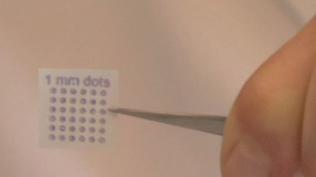A few tiny spots could revolutionize the way doctors test for and diagnose a range of health problems. Researchers at Swansea University, in the UK, have developed a way of putting live antibodies into an ink, which can then be printed on to thin sheets of a specially-coated plastic. This could mean carrying out tests in a GP’s surgery rather than sending samples to a lab.
Dr Chris Philips, a researcher at Swansea Uuniversity, said: “The project has been running for about two years and we’re at the stage where we can happily print antibodies onto pretty much any plastic that we want.”
Using the new printed antibodies, doctors can expose the plastic strip to a blood or urine sample and the results can be read almost immediately by looking at how the dots change colour, or by using a handheld device. The technology could be useful in health centres and GPs’ surgeries, where patients could get almost instantaneous diagnoses. In the future scientists even foresee patients using this technology at home, by themselves.
Dr David Bailey, GP, said: “For some things I think it would be very, very helpful – for when you’re screening for cholesterol, or possibly for slightly low blood counts and things like that, where you’re not too worried about the absolute final accuracy. That might well be very helpful for patients because you can actually tell them the answer there and then when you see them, rather than bringing them back later.”
These new tests could also be used in emergency humanitarian situations and in remote areas.
euronews
Τελευταία νέα
- EUROPALSO - Εγκύκλιος 27/06/2025: Απογραφή ΚΞΓ – Νέο Πρόγραμμα ΔΥΠΑ για εργαζόμενους και ανέργους – Εξετάσεις Ενηλίκων – WaterFun WaterPark – Βεβαιώσεις Σπουδών Society – Νέες Παροχές για ΚΞΓ ESB – Απενεργοποίηση κωδικών E-Europalso – Υποχρεώσεις Ιουλίου-Αυγούστου 2025
- EUROPALSO - ΦΟΡΟΛΟΓΙΚΕΣ ΥΠΟΧΡΕΩΣΕΙΣ ΙΟΥΛΙΟΣ & ΑΥΓΟΥΣΤΟΣ 2025
- EUROPALSO - Νέο Πρόγραμμα ΔΥΠΑ – Με επιδότηση €750
- EUROPALSO: Προσωπικός Αριθμός – Τι Είναι – Πως Εκδίδεται
- EUROPALSO - φορολογικές υποχρεώσεις ιούνιος 2025
- EUROPALSO: Απογραφή υφιστάμενων αδειών ΚΞΓ <75 σε πληροφοριακό σύστημα OpenBusiness έως 1/12/2025
- EUROPALSO Εγκύκλιος 13/06/2025: Απογραφή ΚΞΓ σε OpenBusiness – WaterFun WaterPark – Βεβαιώσεις σπουδών για ΚΞΓ Society – ESB Online Exams for Adults – Νέες Παροχές για ΚΞΓ ESB – Advisory Offices – Υποχρεώσεις Ιουνίου 2025
- Δωρεάν Webinar: Partners in...Creativity! Transforming EFL through Human - AI Collaboration
- 1st Burlington Community Festival: ΔΩΡΕΑΝ για εκπαιδευτικούς και μαθητές 10/5 - Ίδρυμα Σταύρος Νιάρχος
- EUROPALSO Εγκύκλιος 29/04/2025: Απογραφή ΚΞΓ σε OpenBusiness – ESB Online Exams for Students, Κυριακή, 1/6 – ESB Online Exams for Adults – Νέες Παροχές για ΚΞΓ ESB – Advisory Office – Βεβαιώσεις σπουδών – Τουρνουά Σκάκι, 10/5 – Υποχρεώσεις Μαΐου, Νέα ωρομίσθια




